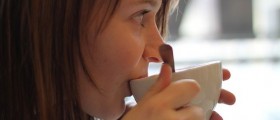
Some people simply cannot live without coffee. It is safe to say that there are more coffee drinkers than those who do not care much for it. However, coffee is not always safe and there are certain situations and medical conditions when a person is not allowed to drink it. Pregnant women, for example, are advised to avoid coffee during nine months of pregnancy, because caffeine in it can harm the baby. Decaffeinated coffee is usually the option for pregnant women who cannot resist the delicious coffee aroma.
Decaffeinated coffee during pregnancy
Pregnant women are well aware that they are not allowed to drink coffee. Some of them are worried that even decaf coffee can harm their baby. In order to clear this doubt, it is necessary to understand what decaf coffee really is.
People usually thing that decaf coffee is completely free of any traces of caffeine. This, however, is not true. The process through which decaf coffee is made consists of processing the coffee so that it keeps the flavor, the aroma and other components, but loses the caffeine content. It is impossible, however, to completely remove the caffeine. It is still there, although to a much smaller degree. It is believed that those amounts of caffeine in decaf coffee cannot harm the baby. However, in order to completely avoid the risk, pregnant women should avoid coffee altogether, decaf or not.
Health risks of decaffeinated coffee in pregnancy
There is no scientific evidence or studies regarding the effects of decaffeinated coffee on pregnant women and their unborn babies. For this reason, even though the amounts of caffeine in decaf coffee are minimal, it is still recommended to cut down on its intake. For example, if a woman used to drink three cups of regular coffee per day before she got pregnant, she should now only drink one cup of decaf, two at most.
Even though it does not contain caffeine, or if the caffeine content is very low, decaf coffee, if drank excessively, can still cause certain health problems. Too much decaf coffee can, for example, cause heartburn, diarrhea, constipation, heart problems and osteoporosis. In fact, too much anything puts a strain on the woman’s body, and that strain reflects on the baby’s growth, development and health.
It is probably safe to say that those women who cannot give up coffee completely should definitely switch to decaf, making sure not to drink too much of it. One, maybe two medium cups per day are considered to be safe both for the baby and for the mother.

















Your thoughts on this
Loading...